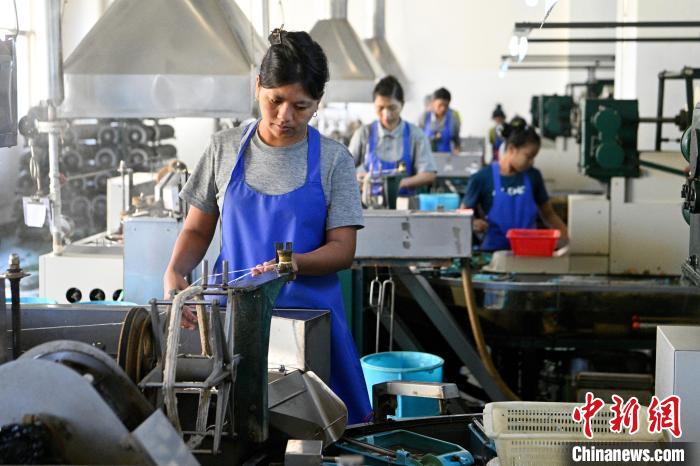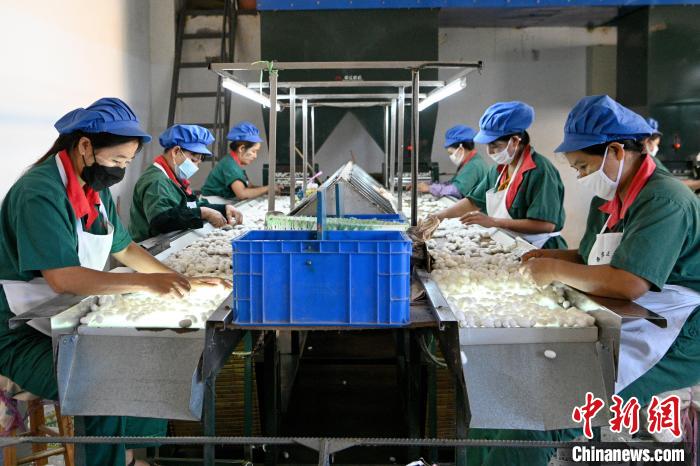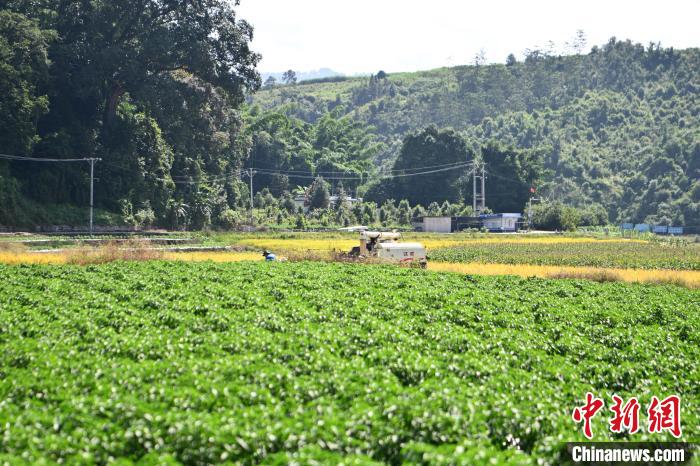China-Myanmar border areas work toward common prosperity

Workers from Myanmar work at a raw silk manufacturing company in Longchuan county, Dehong Dai and Jingpo Autonomous Prefecture, southwest China's Yunnan Province, on Oct. 18, 2023. (Chinanews.com/Li Jiaxian)
"Silkworm rearing rooms should be dry and well-ventilated, and mulberry leaves should be fresh and clean," said Yao Yongliu, who has been cultivating mulberry trees and raising silkworms on 10 mu (about 6,666.67 square meters) of land for nine years.
Yao is very knowledgeable about this agricultural technique created by ancient Chinese. By tending to the silkworms until they spin cocoons, he is able to generate an annual income of 60,000 yuan ($8,198.16) for his family.
Yao lives in Long'an village, Longchuan county, Dehong Dai and Jingpo Autonomous Prefecture, southwest China's Yunnan Province, which is separated by a mountain from Kachin State of Myanmar.
"Farmers on the Myanmar side also cultivate mulberry trees and raise silkworms," said Yao.

Workers are busy selecting silkworm cocoons at a raw silk manufacturing company in Longchuan county, Dehong Dai and Jingpo Autonomous Prefecture, southwest China's Yunnan Province, on Oct. 18, 2023. (Chinanews.com/Li Jiaxian)
Silk has long been regarded as a luxury item by European and American luxury brands, as well as international department stores. In recent years, there has been a shift in focus for some silk companies towards the China-Myanmar border areas, which are known for their vast land and abundant labor resources.
In 2014, a silk company in east China's Shandong Province established Dehong Zhengxin Industrial Co., Ltd., which processes silkworm cocoons into raw silk for export to European countries.
Longchuan county now boasts 53,000 mu of mulberry trees and 2,053 households cultivating silkworms. In 2022, local farmers produced 808 tonnes of fresh cocoons, resulting in a total sales income of 34.36 million yuan and generating an average income of 16,700 yuan per household.
The company employs 650 workers, 90 percent of whom come from Myanmar.

Photo taken on Oct. 17, 2023 shows chili pepper fields in Manghai town, Dehong Dai and Jingpo Autonomous Prefecture, southwest China's Yunnan Province. (Chinanews.com/Li Jiaxian)
One of the workers is a 25-year-old man from Myanmar who has a name that sounds similar to Ying Mingwu when transliterated. Ying Mingwu, who joined the company in April 2023, said that the factory provides accommodation and meals. He earns a monthly salary of 2,000 yuan, which is considered a high income in Myanmar.
Ying Mingwu's family also grows mulberry and cultivates silkworms. "The company sent technicians to Myanmar to teach local farmers how to cultivate mulberry and rear silkworms on our own land. We can earn over 10,000 yuan annually from this trade," said the man.
Wang Tao, deputy general manager of Dehong Zhengxin Industrial Co., Ltd., emphasized that there has been increasing demand for raw silk from Europe in recent years. This surge in demand has resulted in a significant shortfall in the company's silk cocoon supply.
To address this challenge, the company has guided and supported nearly 3,000 farmers in Myanmar in cultivating mulberry plants and rearing silkworms on an area of approximately 30,000 mu.

A machine dries chili peppers at a factory in Manghai town, Dehong Dai and Jingpo Autonomous Prefecture, southwest China's Yunnan Province, on Oct. 17, 2023. (Chinanews.com/Li Jiaxian)
Located more than 100 kilometers away from Long'an village, Lainan village in Manghai town, Mangshi city of Yunnan is separated from Myanmar's Mongko by a river. Even here, the cultivation area of chili peppers is expanding in the fields along the border between China and Myanmar.
"These are industrial-grade chili peppers that serve as raw materials for the production of ship paint, cosmetics, pepper spray, and various other products," explained Ou Yanfa, director of the villagers' committee in Lainan village. The chili peppers cultivated in Manghai town are highly sought after in Sichuan and Guangdong provinces, making them a significant source of income for local growers.
This year, the village provided chili pepper seedlings to farmers across the border in Myanmar, and deducted the cost of the seedlings when purchasing their chili peppers.
Ou's aunt's family lives across the border in Myanmar. In the past, the family made a living by cultivating rice and corn, which barely met their basic needs. This year, they decided to grow chili peppers on a two mu plot of land and were able to earn 6,000 yuan, according to Ou.
At present, the chili pepper cultivation area in Mongko has reached 140 mu and continues to grow.
Photos
Related Stories
- China hopes for stability in Myanmar the most, this remains unwavering: Global Times editorial
- China calls on relevant parties in Myanmar to cease fire, settle disputes via dialogue, consultation: spokesperson
- Chinese Police offer $68,400 reward for telecom fraud ringleaders in northern Myanmar
- Embracing common values of whole mankind: China's commitment to brighter future
- China's road logistics price index edges up
Copyright © 2023 People's Daily Online. All Rights Reserved.









